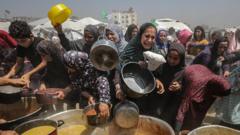A comprehensive assessment by the Integrated Food Security Phase Classification (IPC) warns that Gaza's population is under a serious threat of famine, exacerbated by an enduring Israeli blockade of humanitarian aid. As of April 2023, nearly 2.1 million Palestinians are confronting "extreme levels of food insecurity," according to the findings released by the IPC.
**Gaza Faces Acute Food Insecurity as U.N. Warns of Imminent Famine Risk**

**Gaza Faces Acute Food Insecurity as U.N. Warns of Imminent Famine Risk**
A recent U.N. report highlights critical food insecurity for Gaza's 2.1 million residents amidst ongoing conflict and blockades.
The report cites a severe deterioration in conditions since October 2023 and notes that the previous two-month ceasefire, which temporarily eased tensions, is now a distant memory as hostilities have resumed. The ongoing blockade has resulted in about 244,000 people enduring the worst, or "catastrophic," food insecurity levels, prompting urgent calls for intervention to avert further decline.
For 70 days, Israel has restricted the entry of food, medical supplies, and other essential aid into Gaza, arguing that these measures are part of efforts to pressure Hamas into releasing hostages. This blockade has drawn international condemnation, with the U.N. and various humanitarian organizations warning that using starvation as a weapon could be classified as a war crime.
The IPC report warns that around half a million individuals—approximately one in five people in Gaza—are nearing starvation. An alarming forecast projects that nearly 71,000 children under five will face acute malnutrition within the next year. Households are resorting to desperate measures for sustenance, such as begging and scavenging for food.
The IPC's findings reveal that a staggering 1.95 million people, which constitutes 93 percent of Gaza's populace, are experiencing varying degrees of acute food insecurity. The IPC, a collaboration between global aid agencies and governments, serves as the primary means for determining famine status.
In response to the crisis, Hamas has stated intentions to release an Israeli-American hostage, Edan Alexander, to facilitate a wider ceasefire agreement and support humanitarian aid flow. However, Israeli authorities have not committed to an official ceasefire and have prioritized a "safe corridor" solely for the hostage’s release.
As U.S. President Donald Trump arrives in the Middle East for discussions, Israel warns of expanding military operations against Hamas unless a settlement is achieved. Plans for a more extensive Israeli offensive include potential territorial seizures, the forced relocation of Palestinians, and controversial proposals for managing aid distribution that raise significant ethical concerns amongst international humanitarians.
The IPC concludes that the anticipated aid distribution initiatives are grossly inadequate, and many in Gaza are expected to struggle significantly to access whatever aid is available. The conflict, ignited by Hamas's surprise attacks on Israel in early October 2023, has led to grievous human tolls, with reports indicating over 52,000 fatalities in Gaza since the conflict's onset.
For 70 days, Israel has restricted the entry of food, medical supplies, and other essential aid into Gaza, arguing that these measures are part of efforts to pressure Hamas into releasing hostages. This blockade has drawn international condemnation, with the U.N. and various humanitarian organizations warning that using starvation as a weapon could be classified as a war crime.
The IPC report warns that around half a million individuals—approximately one in five people in Gaza—are nearing starvation. An alarming forecast projects that nearly 71,000 children under five will face acute malnutrition within the next year. Households are resorting to desperate measures for sustenance, such as begging and scavenging for food.
The IPC's findings reveal that a staggering 1.95 million people, which constitutes 93 percent of Gaza's populace, are experiencing varying degrees of acute food insecurity. The IPC, a collaboration between global aid agencies and governments, serves as the primary means for determining famine status.
In response to the crisis, Hamas has stated intentions to release an Israeli-American hostage, Edan Alexander, to facilitate a wider ceasefire agreement and support humanitarian aid flow. However, Israeli authorities have not committed to an official ceasefire and have prioritized a "safe corridor" solely for the hostage’s release.
As U.S. President Donald Trump arrives in the Middle East for discussions, Israel warns of expanding military operations against Hamas unless a settlement is achieved. Plans for a more extensive Israeli offensive include potential territorial seizures, the forced relocation of Palestinians, and controversial proposals for managing aid distribution that raise significant ethical concerns amongst international humanitarians.
The IPC concludes that the anticipated aid distribution initiatives are grossly inadequate, and many in Gaza are expected to struggle significantly to access whatever aid is available. The conflict, ignited by Hamas's surprise attacks on Israel in early October 2023, has led to grievous human tolls, with reports indicating over 52,000 fatalities in Gaza since the conflict's onset.


















